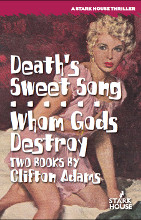
- Death’s Sweet Song / Whom Gods Destroy
- 978-1-933586-64-9
- Clifton Adams is best known for his westerns, but he also wrote two of the best Gold Medal noir thrillers. As August West said of Death’s Sweet Song in the Vintage Hardboiled Reads blog, "This may be the best crime fiction novel that Gold Medal published in the 50s." It’s got it all -— a beautiful, conniving woman, a vulnerable safe, and a guy with lots of moral flexibility. Whom Gods Destroy is the story of a self-destructive bootlegger and the woman he can&apost forgive. Cullen Gallagher of the Los Angeles Review of Books provides a new introduction. Available now.
T
The Desert, The Prairie, and The Gutter: The Noir Novels of Clifton Adams
The Desert, The Prairie, and The Gutter: The Noir Novels of Clifton Adams
by Cullen Gallagher
“You were born in the
gutter,” she said coldly,
“and you’ll live in the
gutter all your life!”
–Clifton Adams, Whom Gods
Destroy
Today, Clifton Adams is
primarily remembered as an author of westerns—and for good reason. Twice he won
the Western Writers of America’s Spur Award for Best Western Novel, first in
1969 for Tragg’s Choice and then
again in 1970 for The Last Days of Wolf
Garnett. His prolific body of work consists of titles that immediately
evoke their genre, including fifty novels with names such as The Desperado,
A Noose for the Desperado, and Lawman.
Westerns may have been Adams’
specialty, but they’re not all that he wrote. In between tales of sheriffs and
outlaws, Adams penned five crime novels: Whom
Gods Destroy and Death’s Sweet Song (both reprinted here), Never Say No To a Killer
(as Jonathan Gant), The Long Vendetta
(also as Gant) and The Very Wicked
(as Nick Hudson). These works stand out not only as some of his best, most
harrowing books, but also as examples of some of the edgiest, innovative, and
most gut-wrenchingly honest and terrifying crime fiction of their day.
Gold Medal published Adams’
first two noir novels. Whom Gods Destroy,
published in 1953, is about Roy Foley, a short order cook in a slummy
California diner who is called back to Oklahoma when his father passes away.
He’s so broke he can’t even afford to pay for the funeral, but when he hears
that the funeral was covered by charity—a charity run by Lola, the girl who
laughed in his face back in high school—Roy decides to get revenge by becoming
a big man in town, taking over the local bootlegging business, and destroying
the reputation of Lola’s politically corrupt husband.
Published two years later in
1955, Death’s Sweet Song is about Joe
Hooper, proprietor of a failing motel in the middle of nowhere. When he
overhears his guests plotting a robbery, he decides to horn in and take the
loot, as well as the girl, for himself.
“But all things end, if you
wait long enough,” Adams wrote in Death’s
Sweet Song. And, in Whom Gods Destroy, “So this is the way
it ends, I thought dully. One jump ahead of the law, two jumps ahead of the
chair.” Clifton Adams passed away on October 7, 1971 in San Francisco, CA due
to a heart attack. Only fifty-two years old, he left behind a body of work
consisting of fifty novels and more than twice that many short stories. Dying
so young cut short an extraordinary career still in its prime.
We’ll never know the novels
that Adams didn’t get a change to write, and that we didn’t get the chance to
read. One thing we do know, however, is that they would have been great. Of
that, I am certain.

No comments:
Post a Comment